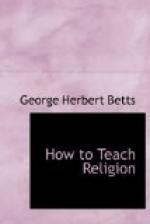1. The law of complete registration. The first act in the memory process is fully and completely to register, or learn, the matter to be retained. The retention can never be better than the registration of the facts given into the memory’s keeping. Half-learned matter easily slips away, never having been completely impressed on the mind. It is possible to lose both effort and efficiency by committing a verse of a poem barely up to the point where it can doubtfully be repeated instead of giving it the relatively small amount of additional study and practice which would register it firmly and completely. Whatever is worth committing to memory should therefore be carried past the barely known stage and committed fully and completely.
2. The law of multiple association. This only means that the new facts learned shall be related as closely as may be to matter already in the mind. And this is equivalent to saying that the material learned shall be understood, its meaning grasped and its significance comprehended. To understand for yourself the value of association, make this experiment: Have some one write down a list of ten unrelated words in a column, and hold the list before you while you have time to read it over just once slowly and carefully. Now try repeating the words in order from memory. Next, have your friend write ten other words which this time form a connected sentence. After reading these words over once as you did the first list, try repeating them in order. You find that you have much trouble to memorize the first list, while the second presents no difficulty at all. The difference lies in the fact that the words of the first list were unrelated, lacking all associative connections with each other, while those of the second list formed a connected chain of associations.
It is possible to give the child biblical or other matter to memorize that has little more meaning to him than the list of unrelated words have to us. For example, this text is required of primary and junior children in a lesson series: “Ye shall know the truth, and the truth shall make you free.” And this: “Let us therefore draw near with boldness unto the throne of grace, that we may receive mercy, and may find grace to help us in time of need.” It is evident that younger children could by no possibility understand either of these beautiful passages, and hence in committing them will only be learning so many unrelated words.
The same is true of church catechisms. The memorizing of such material will be difficult and unpleasant, and no value will come from it. The most likely outcome of such ill-advised requirements is to discourage the child and make him dislike the church school and all its work. It is not to be expected that the child will understand the full meaning of every bit of matter suitable for him to memorize; this will have to await broader experience and fuller development. The material should, however, be sufficiently comprehended that its general meaning is clear and its significance understood.




